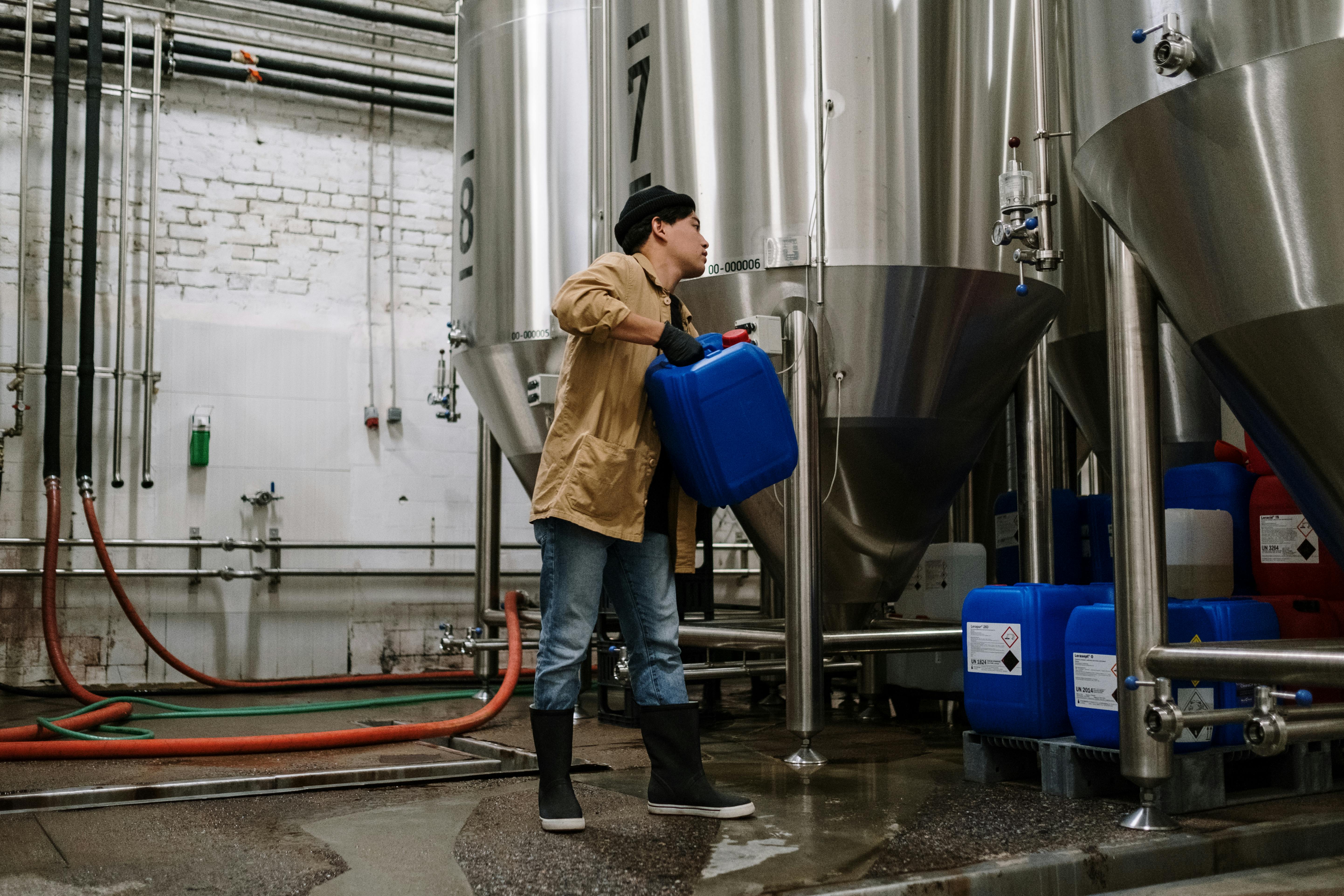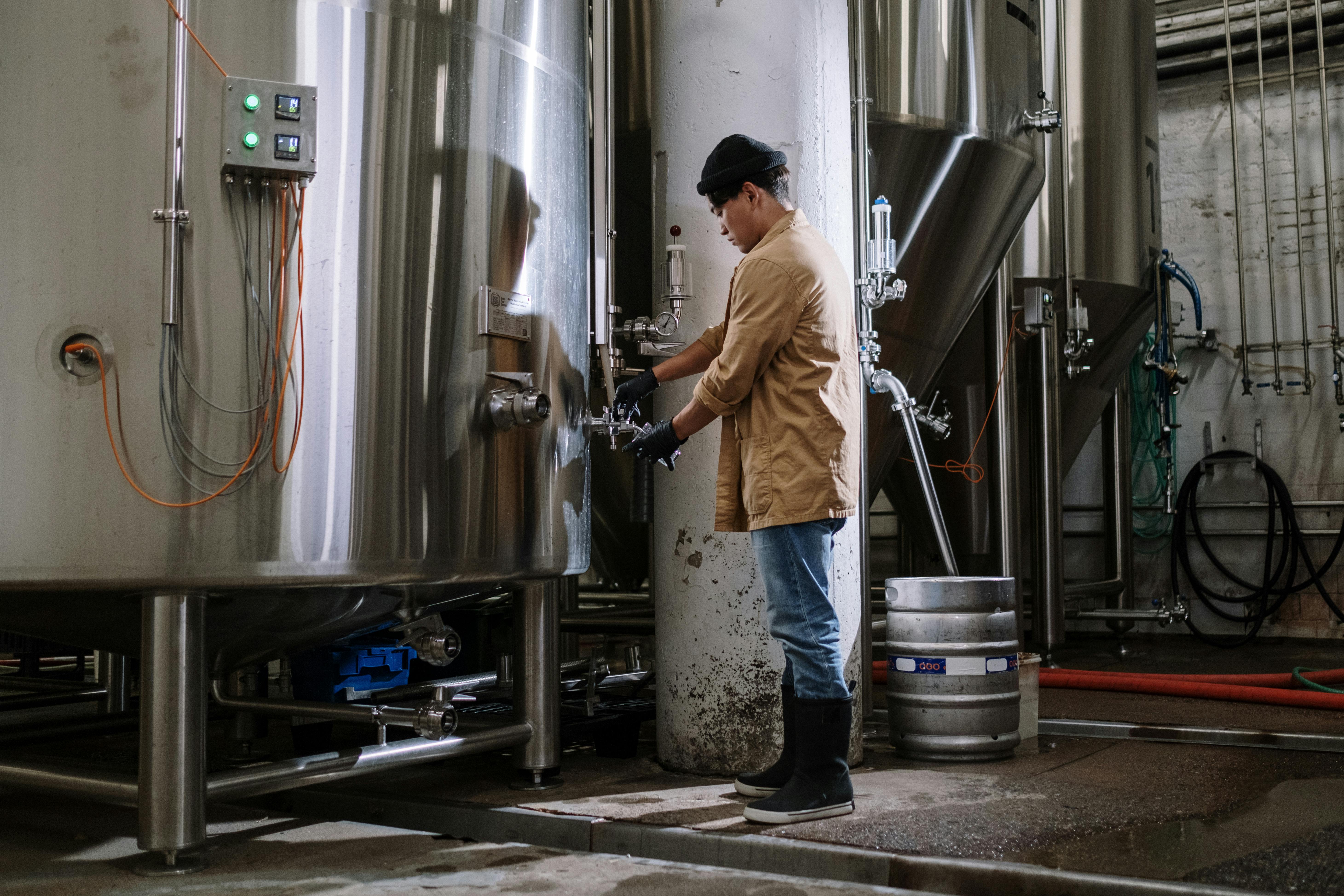Fermentation and distillation are two processes that are used in the production of many food and beverage products. Fermentation is the process of breaking down sugars and starches into alcohol, while distillation is the process of separating mixtures into their individual components. Both processes are used to create a variety of alcoholic beverages, including beer, wine, brandy, whiskey, vodka and gin. They are also used to produce other products such as breads, cheeses, yogurt and vinegar.Fermentation is a metabolic process in which an organism converts a carbohydrate, such as starch or a sugar, into an alcohol or an acid. It is often used to produce food products such as beer, wine, cheese, yogurt, and bread. The process of fermentation occurs when yeast or bacteria break down the carbohydrates without the need for oxygen. This process produces ethanol and carbon dioxide as by-products. Fermentation is also used to produce enzymes and other molecules with useful properties for industrial and medical applications.
Distillation
Distillation is a process used to separate components of a liquid mixture. This process is based on the different boiling points of the substances in the mixture. The liquid is heated until it boils and then vaporized, which separates it from any non-volatile components. The vapor is then cooled and condensed back into a liquid and collected. The collected liquid will contain only the more volatile components of the original mixture. Distillation can also be used to purify liquids such as water or alcohol by removing impurities that could make them harmful or unpleasant to consume. Distillation can also be used to increase the concentration of certain compounds, such as essential oils, perfumes, and flavors.
Distillation has been used for centuries in various industries, such as food production, pharmaceuticals, chemical manufacturing, and oil refining. It is an effective way to separate mixtures with different boiling points because it takes advantage of their different physical properties. Distillation is also a relatively simple process that does not require any special equipment or expensive materials. It can be scaled up or down depending on the size and complexity of the process needed.
Similarities Between Fermentation and Distillation
Fermentation and distillation are two processes used in the production of alcohol. Both processes involve the transformation of natural sugars into alcohol, although the methods of doing so are different. Despite their differences, fermentation and distillation share some similarities.
One similarity between fermentation and distillation is that both require heat to produce alcohol. In fermentation, heat is used to activate the enzymes that break down sugar molecules into ethanol, while in distillation, heat serves to vaporize the ethanol so it can be condensed into a liquid form.
Both fermentation and distillation also require a specific environment. Fermentation occurs best in warm, moist conditions where bacteria and wild yeasts are present, while distillation takes place in a carefully controlled environment with precise temperature and pressure settings.
In both cases, the process of producing alcohol is carefully monitored to ensure quality results. For example, during fermentation, pH levels must be maintained to prevent spoilage; while during distillation, it is important to monitor the temperature to ensure that all of the ethanol vapors are condensed correctly.
Finally, both processes result in alcoholic beverages that contain
Fermentation
Fermentation is the process of converting carbohydrates, such as sugars and starches, into alcohol or organic acids using microorganisms such as yeast or bacteria. The process begins with the breaking down of complex carbohydrates into simpler sugar molecules. This sugar is then converted into alcohol or organic acids by the action of the microorganism. Fermentation does not involve boiling or distilling the liquid, so the end product retains some of the original flavors and aromas of the starting material.
Distillation
Distillation is a process used to separate liquids from solids by boiling them and then condensing them back into a liquid form. The most common type of distillation is fractional distillation, which involves heating a mixture of liquids to different temperatures in order to separate out different components. The boiling point of each component is different, so when heated each component will vaporize at its own temperature and can be collected separately. Distillation removes impurities from liquids and can be used to purify water or alcoholic beverages, as well as produce essential oils and other products from plant materials.
Fermentation
Fermentation is a process in which microorganisms such as yeast or bacteria convert carbohydrates into alcohol or acids. It is an anaerobic process, meaning that it does not require oxygen to occur. The fermentation process begins with the breakdown of sugars and other carbohydrates into simpler compounds, such as ethanol and lactic acid. During this process, energy is released in the form of heat, which can be used to produce various products.
The process of fermentation has been used for centuries to produce food and beverages such as beer, wine, cheese, yogurt, bread, and kombucha. It is also used in the production of various products such as biofuels and pharmaceuticals. Fermentation occurs naturally when certain conditions are met; however, it can also be manipulated through the addition of specific microorganisms or enzymes to speed up or slow down the fermentation process.
The main purpose of fermentation is to convert carbohydrates into energy-rich molecules such as ethanol and lactic acid that can be used by organisms for growth and metabolism. During this process, complex carbohydrates are broken down into simpler compounds through a series of biochemical

Distillation
Distillation is a process used to separate components of a liquid mixture. It works by taking advantage of differences in the boiling points of different components in a liquid mixture. The process involves heating the liquid to its boiling point, which causes the more volatile components of the mixture to evaporate. These vapors can then be collected and condensed back to their original state, allowing them to be separated from the remaining liquid. This process can be used to produce a variety of products, including essential oils, distilled water, flavored liqueurs, and other substances. By controlling the temperature and pressure during distillation, it is possible to produce very pure products.
The basic principle behind distillation is that different substances have different boiling points. When a liquid is heated it begins to evaporate, or turn into vapor form. If that vapor is cooled down again, it will condense back into its original form as a liquid. This means that if you heat up a mixture of liquids with different boiling points, they will evaporate at different temperatures and can then be collected separately once they have been condensed back into their original state. For example, when distilling essential oils
Fermentation Products
Fermentation is a process that involves breaking down carbohydrates to produce alcohol and other products. Common products of fermentation are beer, wine, sake, cider, and liquor. Beer is produced through the fermentation of grain starches, while wine is made from the fermentation of grapes. Sake is a type of Japanese rice wine created through a complex process of fermenting rice with specific types of moulds. Cider is made from fermenting apples or pears and liquor can be produced from a variety of sources such as grains, potatoes, fruits, and herbs. All these products are created through the process of fermentation.
Distillation Products
Distillation is the process of separating components in a liquid mixture. Common products created through distillation include whiskey, brandy, rum, vodka, gin, tequila and absinthe. Whiskey is made from fermented grain mash and then distilled into alcohol. Brandy is made by distilling wine or grape juice to increase its alcoholic content. Rum is distilled from molasses or sugarcane juice while vodka can be produced from almost any type of starch-based material such as
Fermentation and Distillation
Fermentation and distillation are processes that have been traditionally used to produce wine, beer, and other beverages. They are also used to create a variety of products such as vinegar, bread, yogurt, and kombucha. Both processes involve the conversion of sugars into alcohols or acids. Fermentation is an anaerobic process in which microorganisms break down complex sugars into simpler molecules, such as ethanol and carbon dioxide. Distillation is a process of separating components from a liquid mixture based on their boiling point. This can be used to separate ethanol from water or to concentrate the alcohol content of beverages.
Both fermentation and distillation have been around for centuries, but recent studies suggest that they may offer some health benefits as well. In particular, fermented foods may contain beneficial probiotics that can improve gut health by helping to restore the balance of bacteria in the digestive system. Additionally, alcoholic beverages made through distillation contain antioxidant compounds that may help protect against certain diseases. Finally, consuming moderate amounts of alcohol has been linked to reduced risk for heart disease and stroke.
In conclusion, fermentation and dist

Conclusion
Fermentation and distillation are two processes that are used to create various products. Both processes involve the use of microorganisms or chemical reactions to convert raw materials into usable products. Fermentation is used to create beer, wine, bread, and other food items, while distillation is used to make alcoholic beverages such as whiskey and vodka. These processes can also be applied to making essential oils, pharmaceuticals, and other industrial products. Both fermentation and distillation have important applications in the food and beverage industry, as well as in the production of industrial materials.
Although both processes involve the use of microorganisms or chemical reactions to produce a product, they are different in many ways. Fermentation does not involve the use of heat while distillation does. This difference is important because it affects the flavor profile of the finished product. The type of microorganism or chemical reaction used in each process also affects the flavor profile of the end product.
No matter what type of product is being made, fermentation and distillation can be used together or independently in order to produce high quality outcomes. Each process has its own unique set

